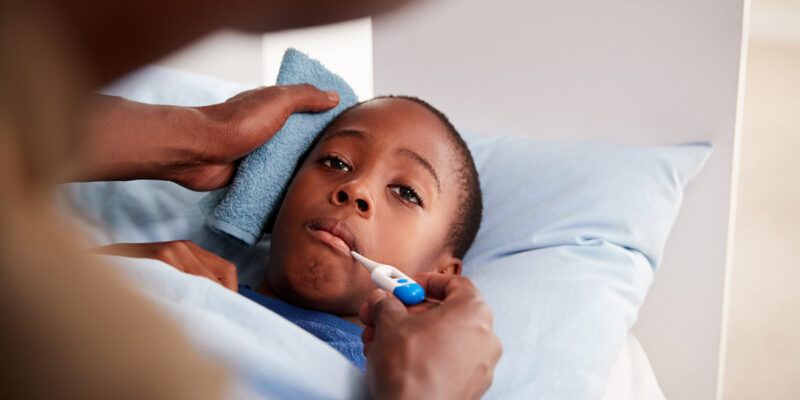Fever in children can be alarming, especially when it spikes suddenly. While a fever is a natural response to infection, knowing when it requires medical attention is crucial for parents. Understanding when to take action can alleviate anxiety and ensure your child receives the care they need. This article explores when you should see a doctor for your child’s fever, helping you differentiate between routine fevers and those that may indicate a more serious condition.
What Is Considered a Fever in Children?
A fever is typically a sign that the body is fighting off an infection. In children, a fever is generally defined as a body temperature of 100.4°F (38°C) or higher. Fever is a common symptom of illnesses such as the flu, ear infections, or colds. Most fevers are harmless and resolve on their own, but certain factors can determine whether it’s time to see a doctor.
When to Seek Immediate Medical Attention
There are instances when a child’s fever warrants immediate medical attention. If your infant is younger than three months and has a rectal temperature of 100.4°F (38°C) or higher, you should see a doctor right away. Babies this young have immature immune systems and can become seriously ill quickly. Fever in very young infants can indicate a severe infection that needs prompt evaluation.
For children aged three months to three years, a fever above 102°F (38.9°C) that lasts more than two days or is accompanied by symptoms such as difficulty breathing, persistent vomiting, or a rash should be evaluated by a healthcare professional. If your child is older than three years and has a persistent fever of 104°F (40°C) or higher, or if the fever doesn’t respond to medication, it’s time to see a doctor.
Other Concerning Symptoms to Watch For
Beyond the fever itself, certain symptoms should raise concerns. These include severe headache, confusion, irritability, a stiff neck, persistent crying, or seizures. Additionally, if your child experiences difficulty waking up, is less responsive than usual, or has blue or purple skin, immediate medical attention is required. These symptoms may indicate a serious underlying condition, such as meningitis or a severe bacterial infection.
Another warning sign is dehydration, which can occur when a fever leads to excessive sweating or reduced fluid intake. Watch for signs like dry mouth, sunken eyes, lack of tears when crying, or fewer wet diapers than usual. In such cases, contact your doctor immediately.
When to Monitor at Home
Many cases of children fever can be monitored at home without the need for immediate medical attention. If your child is playful, eating and drinking well, and responding normally despite a mild fever, you can usually manage the fever with over-the-counter medications like acetaminophen or ibuprofen (always according to the dosage guidelines for children). Keeping your child hydrated and ensuring they get plenty of rest are also effective home remedies.
Keep in mind that fever itself is not necessarily harmful; it’s the body’s way of fighting off infections. However, it’s essential to monitor your child’s overall behavior and comfort level, rather than just the number on the thermometer.
How to Keep Your Child Comfortable During a Fever
Managing children’s fever at home involves making your child as comfortable as possible. Offer plenty of fluids to prevent dehydration, and dress them in light clothing to avoid overheating. You may also want to use a cool, damp cloth on their forehead to reduce discomfort.
Ensure that your child rests in a comfortable environment, free from excessive noise or bright lights. If your child feels chilled or has shivers, provide a light blanket. Over-the-counter medications, when used appropriately, can help reduce fever and alleviate discomfort. Always consult your pediatrician before giving any medication, especially to children under two years old.
When Fever May Be Related to Vaccinations
It’s not uncommon for children to develop a mild fever after receiving vaccinations. This is usually a normal response as the immune system builds protection against the disease. Mild fever following vaccinations typically lasts one to two days and can be managed with fluids and rest. However, if the fever is high or persists beyond a couple of days, consult your pediatrician to rule out any complications.
How Long Is Too Long?
While most fevers resolve on their own within a few days, prolonged fevers can signal something more serious. If your child’s fever lasts more than three days or continues to rise despite treatment, seek medical advice. This could be a sign of a bacterial infection that may require antibiotics or other medical interventions.
In rare cases, fever may be a symptom of more chronic conditions, such as autoimmune disorders or recurring infections, which would require further evaluation by a healthcare provider.
Conclusion
Fever in children is common and often a natural response to infection. However, recognizing when a fever warrants medical attention is essential for safeguarding your child’s health. Immediate medical care is necessary for infants, high fevers, or fevers accompanied by alarming symptoms like difficulty breathing or seizures.
On the other hand, many fevers can be safely monitored at home with proper care and attention to comfort. Always trust your instincts as a parent. If you’re ever unsure or uneasy about your child’s fever, it’s better to consult a healthcare professional. Children’s fever is often manageable, but when it’s paired with concerning symptoms, early medical intervention can make all the difference.













Comments